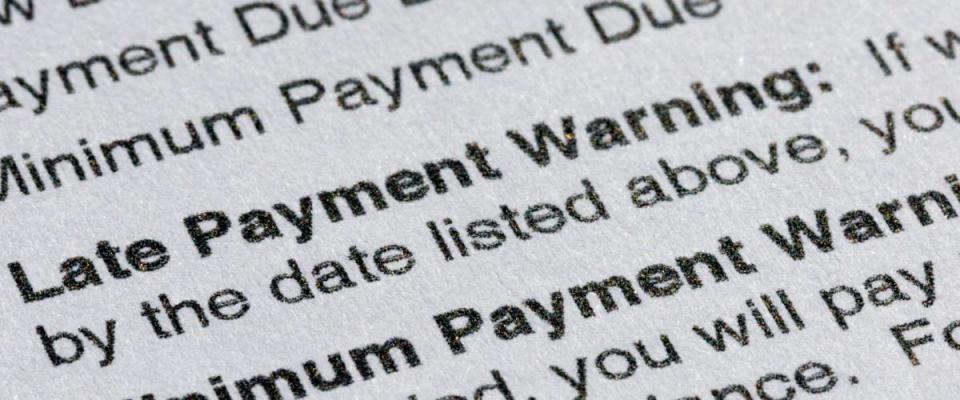10 Foolish Mistakes You're Probably Making With Credit Cards

Credit cards are wondrous things, offering financial flexibility, sweet perks and tantalizing rewards -- but you've got to know how to use them properly.
If you're not taking full advantage of the cards in your wallet, or are allowing credit card debt and fees to become expensive problems, then look in a mirror on April 1 to see a real April Fool. And a May fool, June fool, July fool -- you get the idea.
Here are 10 common ways you might be bungling your use of credit cards. Read on, so you can cut out all of the foolishness.
1. Maxing out your cards

More than half of Americans overspend and max out their credit cards.
Nearly 6 in 10 Americans have maxed out a credit card at least once, according to a 2016 survey from American Consumer Credit Counseling. So, overdoing it with spending and hitting a card's limit is common.
But it's also foolhardy — for loads of reasons. A maxed-out credit card can lower your credit scores and reduce your ability to qualify for new loans.
Plus, higher balances mean higher interest charges. And, credit cards that are tapped out are no help in emergency situations. (But c'mon — you're supposed to have emergency savings to handle those.)
2. Missing out on rewards and perks

Don't forget to take advantage of your credit card benefits.
Credit cards can offer lots of goodies: cash back; airline miles; discounts at Target and other stores; rental car insurance; partial refunds if you buy an item and the price goes up; offers to buy entertainment tickets before everybody else; and on and on and on.
Are you taking advantage of your card perks? You may not even be aware of them all. A study from Market Strategies found that 80% of card users were unclear about their benefits.
So, spend a little time on the websites of the credit cards you use, and review the available rewards and perks. It's a great way to ensure you'll get your money's worth from your cards.
3. Letting earned rewards slip away

Don't miss the boat on using your rewards.
If you've got a rewards credit card, chances are you opened it to earn miles, rewards points or cash back. So why are you letting your rewards evaporate? That's like popping open your trash can and tossing money into it.
You can lose rewards if you allow them to expire. Most major rewards programs do not have time limits on using points and other rewards, but some do — so be sure to read all of the small print on the websites of the rewards cards you carry.
You also can say goodbye to rewards: if you're late with a payment; if your account is closed due to inactivity; or if you cancel a card before you've used up your rewards or have transferred the points, maybe to an airline or hotel program.
4. Revolving a balance

Don't get stuck on the merry-go-round of revolving credit card debt.
Failing to pay off your credit card every month and letting your balance revolve is a foolish move, because the interest charges can potentially add up to hundreds or thousands of dollars in additional debt.
A recent survey from the real estate data firm Clever found that nearly half of credit card users (47%) carry a balance, most often $1,000 or more.
The interest can create serious issues for your budget, and carrying a high balance can even hurt your credit scores. So, get off the merry-go-round of revolving debt. Try to pay off your cards in full every month, because it's much better for your financial health.
5. Making late payments

Making late payments on credit cards can be costly.
Paying down an outstanding balance on a credit card can help your credit scores rise, the Federal Reserve says, but paying your credit card bills late can push your scores down a few notches.
And, that's not the only reason you're a fool if you miss your deadlines for making card payments. You'll incur late fees of up to $28 for a first offense and as much as $39 if you're late again (and again), the Consumer Financial Protection Bureau says.
When you're delinquent, card issuers also can slap you with a higher interest rate — a "penalty APR" — and take away rewards. Setting up recurring payments may be a wise idea if you consistently have trouble paying those bills on time.
6. Failing to watch out for fraud

Monitor your accounts to protect yourself against credit card fraud.
In 2018, there was a 24% jump in reports that scammers had used stolen identities to open new credit card accounts, according to data from the Federal Trade Commission.
It's foolish to think it can't happen to you. Keep a close eye on your credit statements and check your credit reports regularly, so you can spot identity theft and related credit card fraud before it all becomes a serious issue.
If you see evidence that someone has opened accounts in your name, contact the credit card company, notify the credit reporting bureaus, have fraud alerts added to your credit reports, and report the identity theft to the Federal Trade Commission at IdentityTheft.gov.
7. Canceling cards abruptly

Be very careful when canceling credit cards, or you could hurt your credit scores.
Think you may have too many credit cards? Have a few you're not using? It may be tempting to pay them off, cut them up and cancel them immediately — but that can be another foolish maneuver.
That's because closing credit cards often affects what's known as your credit utilization, which is a measure of the amount of your available credit that you're using.
When you cancel cards, you wind up with less credit at your disposal — and your credit utilization goes up, which can damage your credit scores. But hanging on to a credit card with a high limit and a zero balance can hold down your credit utilization, and boost your scores.
8. Making only minimum payments

Make only the minimum payments, and you could pay hefty interest charges.
Because credit card companies are not motivated to help you pay down your accounts as quickly as possible, they tempt you to make minimum payments of as little as $25, or 2% your balance.
But paying only those puny amounts can stretch out the payment process for years, and the interest might easily double what you currently owe. Don't believe it? Just read the "Minimum Payment Warning" on your latest statement. (It has to be there, by law.)
By paying more than the minimum amount each month, you'll pay less interest and can enjoy the fastest possible resolution of your credit card debt.
9. Taking out cash advances

Another costly and foolish mistake with credit cards is to think of them as piggy banks — available sources of cash that you can shake out whenever you need it.
Oh, you will see some piggishness at work if you use your card for a cash advance at an ATM. Your card issuer will charge you a fee, typically a straight $10 or 3% to 5% of the amount of your advance, whichever is greater.
You're also likely to pay a much higher APR on cash advances, and the interest starts accruing immediately. Plus, there are ATM fees, averaging $4.68 per transaction.
Desperate for cash? See if you can borrow it from a buddy instead.
10. Applying for lots of cards at once

If you're feeling hungry for new credit cards, you may want to find a way to control that appetite for plastic.
Applying for multiple credit cards within a short time can result in multiple inquiries appearing on your credit reports, which can significantly lower your credit score. Lenders will wonder why you seem so willing to take on a lot of additional debt.
By spreading out your applications for credit, you can avoid "hard" inquiries on your credit — and a resulting reduction in your credit score.

